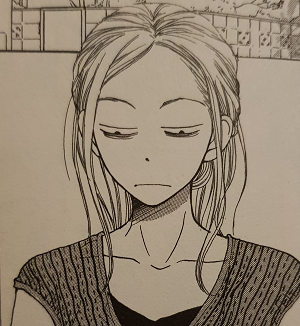Yesterday I went to a café and ended up unintentionally recommending an Italian soda to a couple of old ladies. They were pondering what Italian soda even is and I gave them the answer and mentioned that I liked the rowan berry soda. The old ladies ordered that exact taste and I was like, oops, I hope you like it then and I’m so sorry if you don’t!
And today! We got more snow. ❤ You know, it’s such an amazing thing that even though you’ve lived in the north all your life, every time it snows, you’re still all, “OMG! SNOW!” ha ha.
Anywho~ today’s topic is more on fiction isn’t reality. I’ve written about this before in Pet Peeve of Literary Discussion and Literary Interpretation Ground Rules but I think this will be a bit too long to add to the latter post.
Okay, there’s this thing that people do. They bring up real life or real-life examples to explain something in fiction. What I’ve noticed is that this more often than not happens when people want to deny or excuse something in the text.
Example One:
In Book Five of Harry Potter, Harry tells Ginny to her face that he forgot that Tommy was possessing her all year long in Book Two. That was immediate. That was instinctive. That was the only thing Harry forgot about the whole debacle because he had no memory problems yelling at Ron about saving his little sister when he wanted Ron to get in line and do as he was told.
One explanation for this is that Harry had “post-traumatic stress disorder” from the chamber incident and “in real life” post-traumatic stress disorder works in mysterious ways, which could be why he forgot that particular Ginny-related fact.
And I’m just, I’m sorry, first of all, there’s no post-traumatic stress disorder in Harry Potters, okay? The only post-traumatic stress disorder that Rowling alluded to was survivor’s guilt in Books Six and Seven and that’s it. Like, you can read whatever you want into a text but if the author makes absolutely no mention of it, it’s just not there? As I said before about Hermione in Book Two, for example, I could always assume what Harry is feeling about one of his best friends lying in the hospital wing petrified but there were seriously zero emotional cues in the text itself so?
Second of all, this is fiction. Harry is not real. Therefore, Harry’s reactions aren’t real. Harry is an abstraction created from the imagination and biases of someone else. He reacts exactly as the author makes him react.
So Harry saying to his One True Love’s face that he forgot about the most traumatic experience and year of her life, really shows nothing but how utterly unserious Rowling was about those books and Harry/Ginny. I mean, it’s consistent with Harry’s characterisation because that kid seriously did not waste even one brain cell to think about his One True Love even after they got together. Like, people can be uncomfortable with it all they want but there’s a reason why I started shipping Ginny with Ron, ha ha. Because it’s hilarious, because there’s a surprising amount you can dig into with that pairing, and because Harry/Ginny was that terrible.
A good author? Would’ve made Harry and Ginny bond over their similar experiences. But as I keep saying, we never could have nice things in those books.

Example Two:
Because this ties well with the previous.
In Final Fantasy 7, the original, Cloud Strife forgot a promise he made with Tifa Lockhart, his love interest.
Unlike in Harry Potter, though, Cloud had an actual reason for this in the text as he was being possessed and controlled by an alien parasite, and their promise was re-visited in the pivotal moment of the game.
Again, quite unlike in Harry Potter.
I guess this isn’t really an example, though?
Oh, wait. Now I remember why I brought up Final Fantasy 7, ha ha.
This happens a lot in that fandom. People invalidate the canon pairing with personal real-life experiences all the time. Either it reminds people of a dynamic with an ex or it reminds people of their personal experiences with mental health and how they couldn’t even imagine being a relationship then.
And everybody’s feelings are completely valid, okay? But they’re still not, you know, the text. And as much as someone might not be able to imagine Cloud in a relationship because they can’t imagine themselves in a relationship in the same situation, for someone else it might be hopeful and affirming. That no matter how “messed up” someone is, so to speak, there’s still someone who loves you and stays by you through it all, you know?
It might be fantastical for someone to take a dip in another person’s mind and “fix it” — I know, shocking in a game titled fantasy, ha ha — but that moment had a narrative purpose.
Example Three:
In Bleach, there was this moment when Inoue screamed at her dead love interest to save her.
And the various explanations and excuses for this are: she’s sixteen! she’s traumatised! she’s blah blah blah!
Boring.
She’s not, in fact, sixteen. She’s not real. She’s fictional. If there was ever a moment for her to “rise up” for her love interest, so to speak, it would’ve been when he was lying dead on the ground with a crater in his chest.
But no, instead she screams “Save me, Kurosaki-kun!”
Never mind that most of the main cast in Bleach were all sixteen so the argument doesn’t even work in the context of the manga itself.
The more I see this done in discussions, the more I think it’s made to derail the conversation about the actual text.
